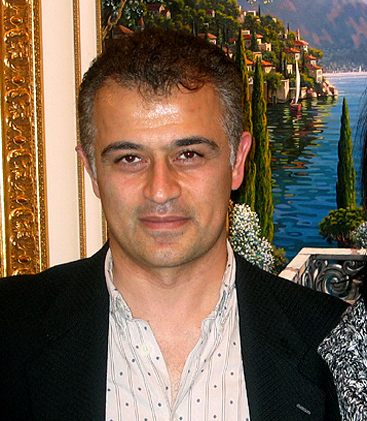Biography
 |
 |
|
Pejman was surrounded by art and
culture from an early age. The son of an operatic composer and
a concert musician, he spent his early childhood in Vienna, and
then by way of England moved to the United States in 1976.
Pejman began painting
by the age of seven, and by the time he was sixteen he had won
numerous awards in group exhibitions. However, despite his art
instructor's insistence for him to pursue an education and career
in art, Pejman decided to enter the field of business management.
Upon graduating from college and after numerous years of employment
at leading Software companies, Pejman secured a position as a
Vice President of Marketing at Information Resources Inc, a global
market research company. |
However, it was not until 1988
when Pejman decided to return to the art world by opening up
an art gallery. As a result of his direct exposure to fine
art and contact with European masters whom he was representing
at the gallery, he decided to start painting again. In 1991
he began his two year formal studies with the world renowned
Russian artist, Anatoly Ivanov. Later he attended the prestigious
New York Art Students League as well as furthering his studies
with the Impressionist master, Ovanes Berberian. In 1995, the
artist founded Pejman Editions, an art publishing company that
would be dedicated to publishing and distributing hand embellished
canvas limited editions of his works. In 1999 Pejman left his
corporate career to pursue his art and publishing career on
a full time basis. Among his art instructors, Ivanov influenced
Pejman the most by inspiring him to use the techniques of old
masters such as Michelangelo and Rafael. Employing these almost
forgotten techniques, Pejman skillfully blends impressionistic
colors and techniques to achieve a classical but yet contemporary
style.
|
Pejman's style is influenced
by such artists as Sir Alma-Tadema, Thomas Cole, and Maxfield
Parrish. All of them sharing the attributes of technical mastery,
form, and perspective. While the influence of these masters is
evident in Pejman's works, it is through his unique arrangement
and depiction of the subject matters that he achieves a distinctive
style. One can classify his style as romantic realism, which
he interestingly enough achieves by portraying beauty and solitude. |
In his works, Pejman
creates idyllic, tranquil worlds. "There are no people in
my paintings, so you can imagine yourself in the scenes",
explains the artist. "The scenes are already romantic, but
my idea is to make them even more so". In doing so, he pushes
the colors to make them more intense and exaggerates the sunlight. "I
don't simplify the shapes. You get into the cracks and feel the
structures and the stones", he says, considering them to
be marks of cultivated wisdom rather than declination. There
is romance in history, and Pejman reminds the viewer of classic
beauty and emotions that transcend time, all inherent to such
places as the Mediterranean. |
Since his first one-man
exhibition in 1993, Pejman has received national and international
attention. His works were chosen to be made into jacquard loom
tapestries in Paris, France and distributed through Design Toscano
in Chicago. Wall size murals are published by ScanDecor in Sweden,
and Portal Publications in San Francisco is publishing a series
of graphics. Pejman's works can be found in many prestigious
galleries and corporate and private collections through out the
world. |
|